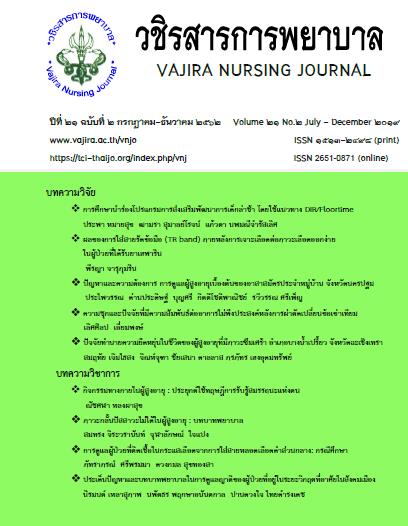Predictive Factors on Resilience Among Older Adults with Depression Bang Nam Priao District, Chachoengsao Province
Main Article Content
Abstract
Resilience is an important factor to promote coping and recovering from crisis and obstacles in older adult with depression. The purpose of this study was to determine factors influencing resilience among older adults with depression. Multi-stage random sampling was used to recruit the samples. There included 85 older adults in Bangnampriao District, Chachoengsao Province. Data were collected in May, 2019. Research instruments consisted of a Personal information record, and interviewed questionnaires, comprised of resilience, optimism, social support, perception of health status, and satisfaction in life. Cronbach’s alpha reliabilities ranged from .60-.89. Data were analyzed by using descriptive statistics, Pearson’s correlation coefficients and Stepwise multiple regression analysis.
The study findings showed that the sample’s mean score of resilience was in moderate level (M = 56.94, SD = 6.40). The predictable variables included perception of health status, optimism and social support (β = .335, p < .001, β = .331, p = .001, and β = .234, p < .05 respectfully). These two significant factors accounted for 39.6 (R2 = .396, Adjust R2 =.374, F3, 84 = 17.73, p < .001) of the variance in explanation of resilience.
These finding clearly indicated that perception of health status, optimism and social support have influenced on resilience in older adult with depression. Nurse, especially mental health and psychiatric nurse, should concern about promoting these factors in order to promote resilience in older adults with depression.
Article Details
เนื้อหาและข้อมูลในบทความที่ลงตีพิมพ์ในวชิรสารการพยาบาลถือเป็นข้อคิดเห็นและความรับผิดชอบของผู้เขียนบทความโดยตรง ซึ่งกองบรรณาธิการไม่จำเป็นต้องเห็นด้วย หรือร่วมรับผิดชอบใด ๆ ทั้งสิ้น
บทความ ข้อมูล เนื้อหา รูปภาพ ฯลฯ ที่ได้รับการตีพิมพ์ในวชิรสารการพยาบาล ถือเป็นลิขสิทธิ์ของวชิรสารการพยาบาล หากบุคคลใดหรือหน่วยงานใดต้องการนำทั้งหมดหรือส่วนหนึ่งส่วนใดไปเผยแพร่ต่อหรือเพื่อกระทำการใด ๆ จะต้องได้รับอนุญาตเป็นลายลักอักษรจากวชิรสารการพยาบาลก่อนเท่านั้น
References
Alexander, P. A. (1998). Metacognition: Answered Unanswered Question, Educational Psychologist. 24(2): 143 - 158.
Aroian, K. J., Norris, A. E. (2000). Resilience, Stress, and Depression among Russian Immigrants to Israel. Western Journal of Nursing Research, 22(1), 54-67.
Beck, A. T. (Ed.). (1979). Cognitive therapy of depression. Guilford press.
Best, John W. (1977). Research in Education. 3rd ed. Englewood Cliffs, New Jersey: Prentice Hall, Inc.
Brook, R. H., Ware, J. E., Davies-Avery, A., Stewart, A. L., Donald, C. A., Rogers, W.H., Williams, K. N., & Johnston, S. A. (1979). Overview of adult health status measures fielded in Rand’s health insurance study. Medical Care, 17(S7), 1-131.
Brook, A. (1997). The Role of Organization Justice in Mediating the Relationship between Quality Programs and Work Outcome. Michigan: Temple University.
Choowattanapakorn, T., Alex, L., Lundman, B., Norberg, A., & Nygren, B. (2010). Resilience among woman and men aged 60 years and over in Sweden and in Thailand. Nursing and Health Sciences, 12, 329-335.
Diener, E. (2002). Very happy people. Psychological Science, 13, 81-84
Diener, E. (2004). Beyond money: Toward an Economy of Well - Being. Psychological Science in the Public Interest, 5, 1-31
Grotberg, E. H. (1997). I AM, I HAVE, I CAN: What families worldwide taught us about resilience.
Grotberg, E. H. (2003). Resilience for today: Gaining strength from adversity. Westport: Praeger.
House, J. S. (1981). Work stress and social support. New Jersey: Prentice Hall.
Jackson,D., Firtko, A., & Edenborough, M. (2007). Personal resilience as a strategy for surviving and thriving in the face of workplace adversity: a literature review. Journal of Advanced Nursing, 60(1), 1–9.
King, L.A., King, D. W., Fairbank, J. A., Keane, T. M., Adms, G.A., (1998). Resilience-recovery factor in post - traumatic stress disorder among female and male Vietnam veterans: Haediness, postwar social support, and additional stressful life events. Journal of Personality and Social Psychology, 74(2), 420-434.
McClain, J., Gullatt, K., & Lee, C. (2018). Resilience and Protective Factors in Older Adults. Dominican University of California, Master’s Theses and Capstone Projects, 296.
Nygren. B., Alex, L., Jonsen, E., Gustafson, Y., Norberg, A., & Lundman, B. (2005). Resilience, sense of coherence, purpose in life and self-transcendence in relation to perceived physical and mental health among the oldest old. Aging & Mental Health, 9(4), 354-362.
Riolli, L., Savicki, V., &Cepani, A. (2006). Resilience in the Face of Catastrophe: Optimism, Peronality, and Coping in the Kosovo Crisis. Journal of Applied Social Psychology. https://doi.org/10.1111/j.1559-1816.2002.tb02765.x.
Scheier, M., & Carver, C. S. (1992). Effects of optimism on psychological and physical well -being: Theoretical overview and empirical update. Cognitive Therapy and Research,16, 201-228.
Seligman, M. E. (1974). Failure to escape traumatic shock. Journal of Experimental Psychology, 74(1), 1.
Shelli, M. W. (1995). Reponding to social change. Pennsylvania: Down, Hutchinson Press.
Souri, H., & Hasanirad, T. (2011). Relationship between resilience, optimism and psychological well - being in students of medicine. Procedia - Social and Behavioral Sciences,30, 1541 – 1544.
Wagnlid, G. M. (2003). Resilience and successful aging: Comparison among low and high income oder adults. Journal of Gerontological Nursing, 1, 42-47.
Wagnlid, G. M. (2009). A review of the resilience scale. Nursing Measurement, 17(2), 105-113.
Wagnlid, G. M., & Young, H. M. (1990). Resilience among older women. Journal of Nursing Scholarship,22, 252-255.
Wagnlid, G. M., & Young, H. M. (1993). Development and psychometric evaluation of the resilience scale. Journal of Nursing Measurement, 1(2), 165-178.

